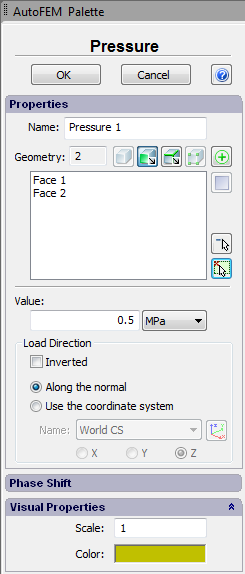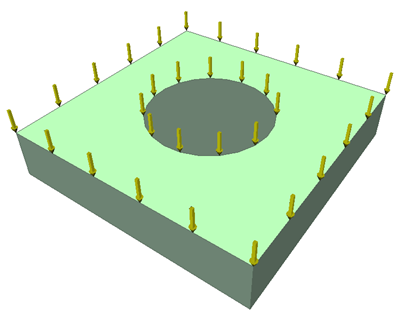 |
AutoFEM Analysis Pressure | ||||||
Pressure represents a loading type used for specifying a distributed load. For specifying the load Pressure, use one of the following ways:
Command Line: |
FEMAPRESSURE |
Main Menu: |
AutoFEM | Loads/Restraints | Pressure |
Icon: |
|
After invoking this command, it is required to select the model’s elements for application of load. With the help of selector options:
|
|
|
|
|
Loads/Restraints on vertices |
|
Turns on the selector in the mode “adding-only”. |
|
Select all entities of the chosen type which are located in the same plane |
select the face or the edge of the analysed model. Selected elements will be added to the list.
You also need to define the numeric value, units, and the load direction.

Numeric value. The value is defined as a magnitude of load acting on an unit area of a face or an unit length of an edge.
Units. For the load Pressure, applied to a face, the following units can be used: N/m2, lbf/in2, kgf/cm2.
For a load Pressure, applied to an edge, the following units can be used: N/m, lbf/in, kgf/cm.
Load direction. The user can select the normal to the loaded face or an axis (X, Y or Z) of the selected local coordinate system (if the local coordinate system is not specified, the global coordinate system will be used by default) as a load direction.
To import the existing local coordinate system, use one of the following ways:
Command Line: |
FEMALCS |
Main Menu: |
AutoFEM | Reference Geometry | Coordinate System |
Icon: |
|
The user can tick the option "Inverted" to reverse the load direction.
In a 3D scene, the load Pressure is shown in the following way:

Typical sequence of steps for defining the load Pressure:
1.Initiate the command "Pressure" ![]() .
.
2.Select face, edge or a sequence of elements.
3.Specify units.
4.Specify a numeric value.
5.Specify direction.
6.Complete the command.
See also: Mechanical Loads, Force, Pressure, Hydrostatic Pressure, Centrifugal Force, Gravity, Acceleration, Bearing Load, Torque, Torque at Nodes, Additional Mass, Remote Force, Remote Moment, Remote Mass